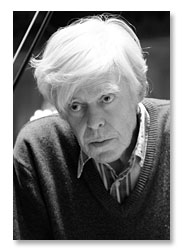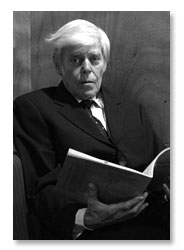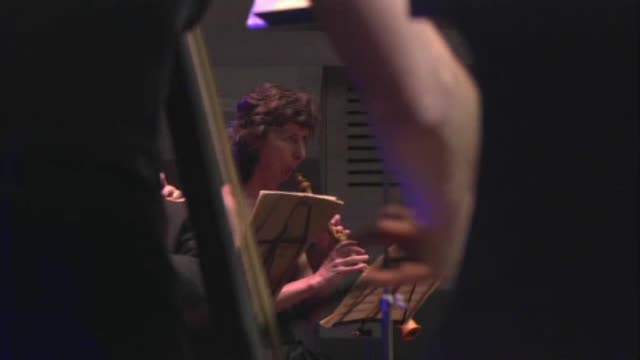

Frans Bruggen studied musicology at the University of Amsterdam; and flute and recorder, with Kees Otten, at the Amsterdam Musieklyceum. Here, where it was possible to study the recorder as one’s principal instrument, he was one of the first students to receive the Dutch Recorder Diploma, in 1953. When only twenty-one he was appointed a professor at the Royal Conservatory at The Hague. Later academic appointments included Erasmus Professor at Harvard University and Regent’s Professor at the University of Berkeley. Bruggen was a leader in the drive towards professionalism in recorder playing, which accelerated steadily with the emergence of vigorously ambitious young Dutch players. He was thus partly responsible for transforming the international view of the recorder from it being seen as a purely pedagogical instrument to one that possessed musical significance in its own right.
In parallel with his academic activities Bruggen launched into a career as a recorder virtuoso and as a flute soloist. As well as performing an extensive repertoire he gave lectures and illustrated performances of recorder music throughout Europe. He also commissioned numerous new works for the recorder, such as Luciano Berio’s Gesti of 1965, which required and received highly theatrical performances. Perhaps most significant in the long term was his participation, together with other major figures in the emergent field of period performance such as Nikolaus Harnoncourt, Gustav Leonhardt and Jaap Schroder, in recordings for the Telefunken label Das Alte Werk. Bruggen said of this highly influential activity, ‘What we have to discover is what the composer wanted, and not what he had to be satisfied with.’
In 1981 Bruggen launched out on a career as a conductor, founding the Orchestra of the Eighteenth Century which was dedicated to the performance of music from the epoch of its name. Its members, who are drawn from more than twenty countries, play on period instruments, or on contemporary copies. They work together three or four times a year for concerts in Holland and on tour. In its structure and size, the Orchestra of the Eighteenth Century closely resembles the luxurious ‘Classical’ orchestras of the period active in London, Paris and Vienna. Bruggen and the orchestra soon established an international reputation and recorded an extensive repertoire for the Philips label, ranging from Purcell, Rameau, Bach and Handel to Beethoven, Schubert and Mendelssohn, with a particular emphasis upon the music of Haydn and Mozart.
Bruggen’s work with the Orchestra of the Eighteenth Century provided an effective springboard for an international career as a conductor. From 1991 to 1994 he was artistic director of the Netherlands Radio Chamber Orchestra in Hilversum; in 1992 he was appointed a principal guest conductor, together with Simon Rattle, of the Orchestra of the Age of Enlightenment, with whom he has also recorded and appeared at the Salzburg Festival; and from 1998 to 2000 he was principal guest conductor of the Orchestre de Paris. In addition, his conducting activities in recent years have included engagements with major traditional symphony orchestras including the Royal Concertgebouw, the Leipzig Gewandhaus and the Vienna Philharmonic Orchestras, to whom he has brought many of the principles of period performance practice.
Bruggen is unusual among the growing number of period performance conductors in that, while maintaining a strong emphasis upon sprung rhythms, clear textures and balance, he often adopts a freer approach in his interpretations to tempi, phrasing and dynamics. The resulting performances have a strongly individual character whilst remaining true to the principles of period practice. This more highly individualised approach to period performance has not always met with contemporary critical approval although its musical vitality is hard to deny. Bruggen’s commercial recordings are now invariably made at public concerts. Among his most distinguished recent recordings are the four orchestral Suites of J. S. Bach, Haydn’s Sturm und Drang Symphonies, and two of the ‘London’ Symphonies, Nos 101 and 103, the ‘Clock’ and the ‘Drumroll’, and the suites from two stage works by Rameau: Acante et Cephise and Les Fetes d’Hebe. Frans Bruggen has been aptly described by the composer Luciano Berio as ‘…a musician who is not an archaeologist but a great artist’.
© Naxos Rights International Ltd. — David Patmore (A–Z of Conductors, Naxos 8.558087–90).
| Title | |
| MOZART, W.A.: Symphonies Nos. 39-41 (Bruggen) | |

|
MOZART, W.A.: Symphonies Nos. 39-41 (Bruggen)
Composer:
Mozart, Wolfgang Amadeus
Artists:
Bruggen, Frans -- Orchestra of the 18th Century
Label/Producer: C Major |
